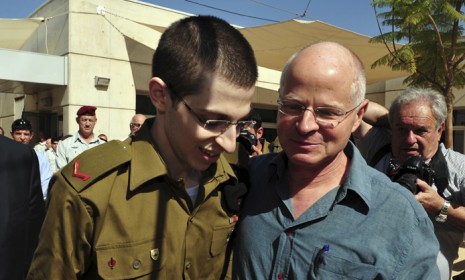Gilad Shalit's release: Did Israel get a bad deal?
Although Israelis are elated to see the young soldier come home, some contend that the 1,000-to-1 prisoner swap is a huge victory for Hamas

A free daily email with the biggest news stories of the day – and the best features from TheWeek.com
You are now subscribed
Your newsletter sign-up was successful
Hamas released Israeli soldier Gilad Shalit on Tuesday after holding him captive for five years. In exchange, Israel freed 477 Palestinian prisoners, most of them to the Hamas-controlled Gaza Strip. It was just the first stage in a swap that will result in the eventual release of 1,027 Palestinians, some of whom have spent decades behind bars for violent attacks against Israel. Was it smart for Israel to make such a lopsided trade?
No. Israel handed a huge victory to Hamas: It was a relief to see Shalit, who was just 19 when he was captured, finally released, says Melanie Phillips at Britain's Daily Mail. But Israel paid too high a price by agreeing to free more than 1,000 "Arab terrorists." This "deal with the devil" weakens the moderate Palestinian leadership of Mahmoud Abbas' Fatah faction, strengthens Hamas, and may mark "the collapse of the peace process."
"Shalit's release marks the collapse of the peace process"
The Week
Escape your echo chamber. Get the facts behind the news, plus analysis from multiple perspectives.

Sign up for The Week's Free Newsletters
From our morning news briefing to a weekly Good News Newsletter, get the best of The Week delivered directly to your inbox.
From our morning news briefing to a weekly Good News Newsletter, get the best of The Week delivered directly to your inbox.
At least Israel is trying to limit the damage: The government of Israeli Prime Minister Benjamin Netanyahu is well aware that this was a risky move, says Karl Vick at TIME. Relatives of terrorism victims were appalled, and Israeli officials calculate that 60 percent of the released terrorists may resume their attacks. But Israel is trying to prevent future problems this time around by sending most of the former prisoners to Gaza, "which is sealed off from Israel," while exiling the worst offenders to Turkey, Qatar, or Syria.
"Gilad Shalit release: Israel's joy tempered by memories of an Intifada"
Actually, Israel got the better deal: This swap may boost Hamas' stature, says M.K. Bhadrakumar at Asia Times, but "Israel has won hands down." This painful bargain could patch recently frayed relations with Turkey (which reportedly consulted with both Israel and Hamas on the swap). But Israel's "most precious gain is going to be that it is back in business with Egypt," which actively brokered the deal. After the upheaval of the Arab Spring, Israel has reestablished the trust of "the one Arab neighbor it simply can't do without."
"Shalit: Israel wins, but it's only half-time"
A free daily email with the biggest news stories of the day – and the best features from TheWeek.com
-
 Buddhist monks’ US walk for peace
Buddhist monks’ US walk for peaceUnder the Radar Crowds have turned out on the roads from California to Washington and ‘millions are finding hope in their journey’
-
 American universities are losing ground to their foreign counterparts
American universities are losing ground to their foreign counterpartsThe Explainer While Harvard is still near the top, other colleges have slipped
-
 How to navigate dating apps to find ‘the one’
How to navigate dating apps to find ‘the one’The Week Recommends Put an end to endless swiping and make real romantic connections